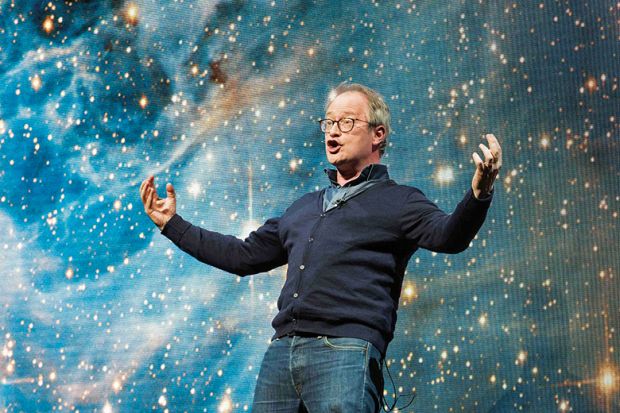When he was at school, writes Robin Ince, he became alienated from science by “the science boffins’ strange aura of unknowable exclusivity”.
Much of his subsequent career has been dedicated to breaking down his misconception that scientists have “different brains”. He first became interested in science again, he told Times Higher Education, when he read a few books showing how the scientific method could be used to demolish pseudoscience. The first was James Randi, Psychic Investigator, based on a television show where the magician and sceptic “tested people’s abilities with dowsing and different psychic abilities. Even though I didn’t believe in those things, I wouldn’t have known how to refute those parapsychological ideas if someone had challenged me.”
By this point, Mr Ince was an established stand-up comic but dispirited by the fact that many of his peers were “jaded, cynical and mean-spirited”, so he “decided to make shows that were celebratory, mixing up musicians and comedians and sneaking in a particle physicist, a geneticist or an epidemiologist”. This led to the long-running BBC Radio 4 series he hosts with physicist Brian Cox, The Infinite Monkey Cage, and then the record-breaking science show they have now performed live to a quarter of a million people around the world.
THE Campus resource: A framework for building capacity in digital teaching and learning
In The Importance of Being Interested: Adventures in Scientific Curiosity, Mr Ince celebrates the wonders of science, draws on his many discussions with leading scientists and pays particular attention to the topics – the size of the universe, the death of the universe, whether we are alone in the universe, whether studying science can destroy religious faith – which he knows can often induce “existential anxiety”.
“I wanted to lure people back into these ideas,” he explained. “Some of the most frightening ideas come from science, but the more you look at them, the more comfort and wonderful stories you can find in them. It opens up your curiosity.”
It was a great pity, in Mr Ince’s view, that there was not more science “in the newspapers or on daytime television, not just in the corners where science is meant to be…There was a time in the 1970s when scientists, philosophers and union leaders would sometimes appear on mainstream chat shows. Now you get actors talking about a film where they have played a scientist or philosopher.”
This had helped lead to several misconceptions about science. When people hear that “the size of the universe is billions of light years”, Mr Ince suggested, “they imagine scientists have a true idea of what that actually means. They don’t! It just means it’s really, really big. There isn’t a huge chasm between what a cosmologist understands and what I understand when I hear those words.”
Furthermore, contrary to stereotypes about scientists being unapproachable and antisocial, Mr Ince believed that many “love mucking around and playing with ideas. In the green room of a science festival, the atmosphere is exuberant, everybody is laughing, having a drink and saying how amazing other people’s papers are; at a book festival, everyone is sat alone with their PR person complaining that someone else has won the Orange Prize!”
In recent years, as Mr Ince saw it, scientists had become much better at moving beyond graphs and statistics and turning what they had to say about vaccination or climate change, for example, into “emotional stories people can approach and digest”. We even witnessed Peter Higgs crying “when saw that the ideas he had had 50 years before had been worth a Large Hadron Collider – though then journalists wanted him to cry more and kept needling him”.
As part of his publicity for The Importance of Being Interested, Mr Ince is performing in 100 bookshops across the UK and asking each bookseller to recommend the book that most stimulated their curiosity.
Given that he first rediscovered an interest in science by seeing how it could be used to fight pseudoscience, what kind of role does Mr Ince see for science in combating conspiracy theories today?
Anyone who spends time with conspiracy theorists, he replied, soon came to “realise how unhappy so many of these people are, even if that is sometimes expressed in ludicrous ideas and hatred for others…The world is filled with all manner of injustices, and some people find any explanation – even extraterrestrial reptiles or a group of very rich men who get naked in front of an owl – more digestible and consoling than accepting reality.”
While it was pointless to get into arguments about why the earth is not flat or something equally obvious, he said, it might be worth using science to say, “Let me tell you another story, which I think is a better story and has some really beautiful things in it.”
POSTSCRIPT:
Print headline: Robin Ince: ‘science has stories of beauty and wonder’
Register to continue
Why register?
- Registration is free and only takes a moment
- Once registered, you can read 3 articles a month
- Sign up for our newsletter
Subscribe
Or subscribe for unlimited access to:
- Unlimited access to news, views, insights & reviews
- Digital editions
- Digital access to THE’s university and college rankings analysis
Already registered or a current subscriber? Login








